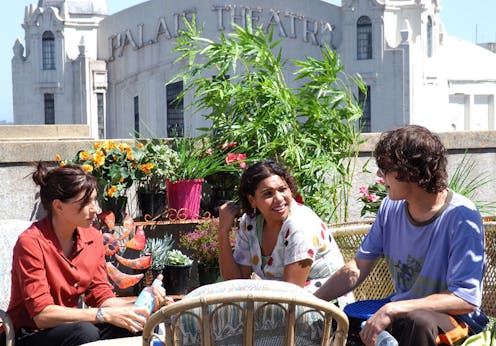I turned to The Secret Life of Us for warm nostalgia. Instead, I found jarring memories
- Written by Lisa Portolan, PhD student, Institute for Culture and Society, Western Sydney University

Our writers nominate the TV series keeping them entertained during a time of COVID.
In the throes of lockdown, the desire for certainty is unequivocal. The pandemic has shattered the predictability of our everyday lives, making the future precarious. Where to seek solace? In nostalgia, perhaps. The sentimental longing or wistful affection for a period in the past.
For me, memories of The Secret Life of Us screamed comfort, certainty and nostalgia. Stumbling upon the four seasons on Netflix was akin to blundering into a roomful of marshmallows. Bliss.
The series depicted the messiness of a group of 20-somethings in Melbourne as they navigated sex, love, careers and friendship.
In 2001, it seemed to reflect our lives with absolute accuracy. Filmed along the familiar streets of Melbourne, The Secret Life of Us was a refreshingly authentic portrayal of ordinary life: shared apartments, house parties, pints at the bar and laps in the outdoor pool.
I was 19 when The Secret Life of Us premiered. I, too, wore crop tops and low waisted jeans and listened to bands like Leonardo’s Bride and Pollyanna — music now relegated to the retro category. I, too, was a bit of a loser, with a messy sort of life, and importantly, great friends. I, too, was infatuated with freelance writers who were heading nowhere, and who never gave me the time of day.
Here was my life celebrated on screen.
Read more: In my end is my beginning: why TV streaming services love exploiting your nostalgia[1]
‘We need someone to love’
The magic of The Secret Life of Us, which first aired on Ten, was how it broached topics rarely discussed on free-to-air television. Threesomes, tampons and whether or not guys actually cared if women had orgasms. Things that we all talked about, but never saw represented in popular culture.
Evan (Samuel Johnson), Alex (Claudia Karvan) and Kelly (Deborah Mailman) became household names, but also cultural icons: the beacons of a misspent noughties youth.
Appearing on streaming platforms some 20 years later, the program has seen a major resurgence[2].
Discussing its renaissance, Judi McCrossin, who wrote the first three series along with Christopher Lee, has said[3]:
I don’t think the human condition has changed all that much — we need someone to love, something to do and something to look forward to. And that’s across every culture and every time period.
Certainly, there is something incredibly honest and familiar about the Australian coming of age story represented in The Secret Life of Us.
Contemporary overseas dramas like Fleabag and Girls have depicted this messy, early adult period — the moment when everything and nothing seems possible all at the same time — but they’re touched by a certain sanitised sophistication.
Read more: Fleabag’s feminist rethinking of tired screenwriting tools[4]
The Secret Life of Us encompassed the awkward, unequivocal dorkiness of an Australian youth. There was a jovial irreverence to the tone which seemed to reflect contemporary Australian humour and our fait accompli nature.
Our lives — as strange and wonderful as they were at the time — were right there.
The uncomfortable truth
I started my rewatch with the hopes of indulging in the nostalgia of my 20s: a time when the world was COVID-free, and my life was splendidly uncomplicated.
But watching back, I felt extraordinarily uncomfortable. Instead of warm and fuzzy memories, I was flooded with very real recollections. It reminded me of how much of an actual mess I had been, and not in a messy, fun, coming-of-age sort of a way. It reminded me of how I had often minimised myself not to disrupt the comfort of the men around me.
Rewatching The Secret Life of Us, searching for an early-20s nostalgia, I actually discovered something quite different. Despite the uncertainty of a COVID-world, I was intensely pleased and grateful I was in my 30s and had actual responsibilities.
I didn’t have the best sex of my life in my 20s, nor did I land the dream career, or even value significant friendships. It was a decade characterised by missteps, inertia and lack of self-worth.
But in my 30s, I felt secure in the knowledge of who I was. I could walk my path confidently. I became the writer I would have been infatuated with over a decade ago.
Nostalgia should be warm and comforting. The Secret Life of Us was the exact opposite for me. It was jarring and confronting: it smelt like weed and cheap wine. It reminded me of boys with poor hygiene and bad haircuts, who never called you back. In a searing and unapologetic way, it recounted some of the sub-standard behaviour accepted in my 20s, simply because I was a young woman and I thought it was acceptable.
The Secret Life of Us is an iconic Australian series. But it captures a moment in time so accurately, so honestly, I couldn’t actually experience nostalgia in the reruns.
There’s no wistful longing for the past, just a mirror of what was.
The Secret Life of Us can be streamed on Netflix, Amazon Prime and 10Play.
References
- ^ In my end is my beginning: why TV streaming services love exploiting your nostalgia (theconversation.com)
- ^ major resurgence (www.smh.com.au)
- ^ has said (www.smh.com.au)
- ^ Fleabag’s feminist rethinking of tired screenwriting tools (theconversation.com)

















